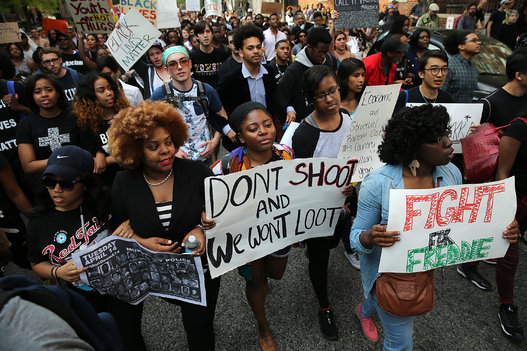Much ado has been made the past couple weeks, over whether "hate speech" is protected by the First Amendment. This, to my mind, clouds the issue. It's not relevant to the discussion about the failed "jihadi" attack in Garland, Texas.
I will repeat that, because it bears repeating. A discussion on First Amendment protections — or the lack thereof — for "hate speech" is completely irrelevant to the discussion of the failed "jihadist" attack in Garland, Texas.
 |
| Offensive? Possibly, but still not a call to murder. Translated: "100 lashes, if you're not dying of laughter!" (source: Huffington Post) |
To be honest, it's hard to believe that simple truth can be called into question so easily. But it has, and now we have to deal with the fallout.
Click through to continue reading.
But now that that's been said and we're on the topic, let's talk about "hate speech" and the First Amendment. We should start with a definition of "hate speech" as a term. Naturally, there are several, depending on who you ask.*
Dictionary.com offers this one:
[S]peech that attacks, threatens, or insults a person or group on the basis of national origin, ethnicity, color, religion, gender, gender identity, sexual orientation, or disability.
 |
| Cult of the Perpetually Outraged™, Baltimore chapter, marching for "social justice" and "wealth redistribution" … or something. (source: Huffington Post) |
The definition at U.S. Legal isn't much better:
Hate speech is a communication that carries no meaning other than the expression of hatred for some group, especially in circumstances in which the communication is likely to provoke violence. It is an incitement to hatred primarily against a group of persons defined in terms of race, ethnicity, national origin, gender, religion, sexual orientation, and the like. Hate speech can be any form of expression regarded as offensive to racial, ethnic and religious groups and other discrete minorities or to women. [emphasis added]Again, looking at the underlined section, it clearly burdens the speaker with the responsibility for how others will respond — it's only "hate speech" if it could provoke a violent response, like "fighting words" (we'll come back to that) — and the wording of the last sentence implies that offensive or inflammatory speech toward "white people" and "Christians" is not "hate speech", since those groups are not "discrete minorities".
In addition, look at the last three words, "or to women". Under this definition, if taken literally, a man can be held responsible for "hate speech" if he says something derogatory about women, but a woman (even an ultra-feminist-supremacist-type who obviously hates the entire male half of humanity) isn't burdened by the same social responsibility to police her speech about men!
The American Bar holds a markedly similar definition as Dictionary.com's above, complete with the same flaws.
And these are supposed to be a "legal definitions"? Bah!
 |
| Sheldon Nahmod (source: Nahmod Law blog) |
Hate speech can be defined as speech directed at a historically oppressed religious or racial minority with the intent to insult and demean.I bolded this one because it's the definition I'll be using for the remainder of this post; the only things I'd change would be to swap the word "class" for "minority" and include socio-political classes (e.g. "middle class", "Republican", "Libertarian", "one-percenter", etc.). Of particular interest — and the primary reason I chose this one — is its inclusion of the word "intent". This is a concept the previous definitions were missing. Using mean words, even inappropriate or offensive words, isn't "hate speech" unless the speaker intends it to attack, threaten, or demean the
But either way, offensive speech isn't "hate speech" under this definition until and unless there's a specific intent to attack, threaten, or demean a whole group based on unverifiable opinions; it does not apply to mere criticism, biased or not**, and it does not apply to arguably true statements directed at an individual or group, however offensive.***
 |
| NOT "hate speech" (source: Bosch Fawstin's blog) |
But all that argument about what is — and is not — "hate speech" just serves to take us away from the actual question posed at the very top of this article: Is "hate speech" protected by the First Amendment?
And the answer to that question is a resounding, "YES!"
The U.S. Supreme Court has long been very cautious about curtailing the manner and content of individual's right to speak his or her mind freely, or to engage in creating art, publishing literature, or gathering together with other like-minded individuals. (Remember I said in Part 1 that an attack on Pamela Geller's First Amendment rights for organizing the event is an attack on free association and free assembly, in addition to an attack on free speech; they're all tied together.) The Justices' opinions are so nuanced and narrowly-tailored, that to this day the "quick answer" is usually wrong by virtue of simply being a "quick answer". A few cases in point:
- Myth: It's unlawful to shout "Fire!" in a crowded theater.
Reality: It is absolutely lawful to shout "Fire!" in a crowded theater … if there's a fire. As a (presumably) civic-minded citizen, you can and should take reasonable steps to protect those around you, even if that means causing a small disturbance in order to alert them to a greater danger (think: lesser of two evils). You just cannot invoke the First Amendment to absolve yourself of criminal or civil liability for damages that occur during the ensuing panic if there is no actual danger. - Myth: It's unlawful to burn a cross on a black neighbor's lawn.
Reality: The act of burning a cross, while offensive and abhorrent due to its historical use and significance, was nevertheless held to be under the protection of the First Amendment as "free speech", but as in the first myth above, the cross-burner is still liable for any injuries or property damages his giant open flame causes. - Myth: You cannot utter "fighting words" (i.e. insulting words intended to provoke a violent response from a normally-reasonable person).
Reality: The "fighting words exception" was narrow to begin with, and has been further narrowed through subsequent opinions. As I understand it, you are certainly allowed to use "fighting words", but if the guy you're egging on punches you in the mouth, he may be guilty of assault (local laws vary; some places do have "fighting words" exemptions for simple assault), but you cannot also have him charged for violating your First Amendment rights.
 |
| Intimidating? Yes. Distasteful? Yes. But still protected under the First Amendment. (source: Albany Herald) |
 |
| Sir William Blackstone (source: Wikipedia) |
Now, there are some "free expressions" and "art forms" that are not protected by the First Amendment — obscenity, child pornography, and direct, credible threats of physical harm come to mind — but it goes even deeper than that. In that "Nahmod Law" blog post, the same article in which we found the definition of "hate speech", he points out that "hate speech" — unlike obscenity, which has no redeeming social value; or child pornography, which necessarily causes actual harm to its "subjects" during its creation, in addition to having no social value — is usually inherently political. In his closing words:
The Supreme Court’s answer to this particular question is that even hate speech contains political ideas, however horrible these ideas may be. When you regulate such speech, you are also regulating ideas. Think of George Orwell’s Animal Farm and forbidden words. The Supreme Court has also made clear that just because speech offends people, this is never a justification under the First Amendment for punishing it. Furthermore, we are justifiably suspicious of government when it attempts to regulate speech and ideas. After all, government may have its own political agenda in regulating hate speech — which groups would be protected against hate speech and which not?"Hate speech" must be protected, therefore, because even when it's insulting, demeaning, or — at its most extreme — intimidating, it produces discussion and opposing speech, thus furthering the cause of an open dialog, which is precisely the kind of speech the First Amendment was enacted to protect. If "hate speech" were banned, not only would such a prohibition create an Orwellian class of "thought criminals", it would effectively shut down the very societal mechanism which counters "hate speech".
Finally, and perhaps most important, think about how the marketplace of ideas functions: even if hateful ideas are communicated, the theory (hope?) is that counter-speech will emerge to rebut it and to fight it. In other words, more speech rather than less is the remedy. [emphasis in original]
It's like conservatives have been saying all along: The solution to unpleasant or offensive speech is more speech, not less. The solution to diminishing attendance in church is to reach out to the community and offer to help people, study the Bible with them, and to pray with (and for) them, not to cloister ourselves; to worship and evangelize more, not less. The solution to censorship is to speak more, especially about the censorship itself.
Expose it, argue it, fight it, and defeat it.
Exercise your rights; it's the best way to fight their abridgement.
Stay safe.
------------
* - Naturally, in true "legal-ese" fashion, if we check four sources, we'll get six different answers.
** - Because let's face it, if mere criticism was considered "hate speech", we'd have to look no further than any anti-gun or anti-freedom group's Facebook page or Twitter feed and read their (and their commenters') opinions on Wayne LaPierre, the NRA, gun owners, and libertarians or conservatives in general to find some truly hateful vitriol.
*** - Now, the "offensive" statements must be at least arguably true, or we can just stop worrying about whether such statements are "hate speech" at all; credible accusations of "slander" and "libel" are just as bad for the speaker's reputation.
**** - And as an extension to that argument, it's Constitutionally invalid to require law-abiding citizens to prove their innocence — via a mandated "background check" — before allowing them to exercise their rights. It's a violation of the Second Amendment right to keep and bear arms and the Fifth Amendment right to due process. In any other context, we don't need to prove our innocence before exercising our rights; rather, the authorities need to prove our guilt before abridging them!
The response to evil ideas being expressed like those in Mein Kampf, the communist manifesto, the koran is other and better ideas like the Federalist papers and the Bible. We have to put up with the trash so that we do not put the pearls at risk. Let people judge the validity and veracity of ideas in speech and text free of the lens of governmental interference, censorship, or persecution.
ReplyDeleteExactly! More speech, not less. The solution to evil ideas is to overwhelm it with countering good ideas, not to snuff out the evil ones. The people are perfectly capable of deciding for themselves which ideas are good or evil.
DeleteIn the long run, which is better? For bad ideas to be heard publicly and summarily shouted down? Or to not let them be heard in public, so that they're only spoken in hushed tones, fester in the souls of evil men, and the good men never even realize that such ideas exist?